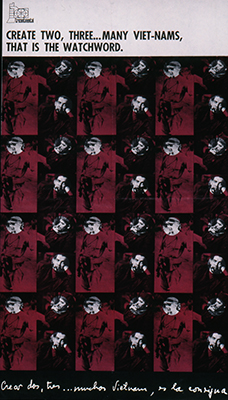- International Affairs
- Key Countries / Regions
- Middle East
- History
- Military
- Contemporary
- US
- World

President Biden has promised that by 2022, the residual American military forces will leave Afghanistan. When that happens, it will complete the trifecta of American failure in its three major wars in the last half century: Afghanistan, Iraq, and Vietnam. Having spent years in Vietnam, when I look back, several causes for our failure there stand out.
The Unbridled Power of the Johnson White House. President Johnson bullied and berated the Joint Chiefs of Staff, who meekly acquiesced. The president and a small civilian coterie—particularly a supine yet arrogant Secretary of Defense—made incremental war decisions based on doing the minimum, shutting out Congress, and misleading the public. Their guiding idea was that erratic demonstrations of American power would convince North Vietnam to desist.
The Military Senseless War of Attrition. The Joint Chiefs knew that a half million American troops, heavy bombing across North Vietnam, and ground incursions into the North were necessary. Instead, they backed the field commander, General William Westmoreland, who waged a senseless war of attrition, sending American battalions in the jungle to slug it out with tough North Vietnamese soldiers, whose government was willing to sacrifice a million of them to seize the south. Westmoreland was not relieved of command until after Tet in 1968.
The Two-way Tilt of Tet, 1968. During the Tet holidays of 1968, the Hanoi government unleashed a massive assault upon the cities of South Vietnam, believing the people would rise up in support. The result was a shattering military defeat, counter-factually portrayed in the American press as proof that the war was lost.
Two consequences gradually followed from 1969 through 1971. In South Vietnam, the guerrilla forces (Viet Cong) were decimated and the North Vietnamese regular divisions had to fall far back into the jungles. But in the United States, the anti-war student protests gained momentum and most Democratic members of Congress turned in unified opposition against the war.
Nixon’s Resignation Sealed the Fate of South Vietnam. By 1973, President Nixon had withdrawn American troops, while promising fulsome military supplies to the South Vietnamese and heavy aerial bombing against any North Vietnamese offensive. Once he resigned, the Democratic majority in Congress forbade any bombing in Southeast Asia and slashed military supplies to South Vietnam. In contrast, Russia and China provided North Vietnam with a vast quantity of trucks, armor, artillery, and munitions. On April 30, 1975, Saigon surrendered to North Vietnamese forces.
False Narrative. The narrative of the mainstream press, academia, and most historians holds that victory by the North was inevitable. The war was unwinnable from the start because the Marxist leaders in the North were the true nationalists, while the Southern leaders were fractious and corrupt. There is some truth to that, as was true in South Korea in 1953. Back then, South Korea would have fallen, had the U.S. military not stayed. Over the next seven decades, American influence has gradually transformed South Korean domestic politics.
In contrast, after Nixon’s resignation, we chose by our democratic process to quit in South Vietnam. We cut our aid and walked away. South Vietnam did not fall due to historical predestination, or to irremediable faults in South Vietnamese leadership.
Bing West fought as a Marine grunt in Vietnam in 1966–67. As an analyst for the Rand Corporation, he made extended trips across Vietnam in 1967, ’68, and ’69. In 1971 Defense Secretary Melvin Laird sent him to Cambodia to assess the Cambodian army. In 1975, he served as Special Assistant to Defense Secretary James Schlesinger as Saigon fell. He has written two books and numerous analyses about the Vietnam war. His latest book is The Last Platoon: A Novel of the Afghanistan War.















